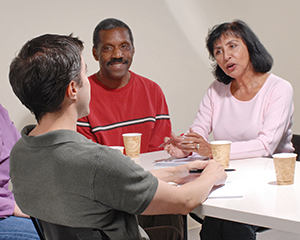Facing a chronic illness alone can be hard for you and your family. If you have fears or concerns, talk with people close to you. Talk with your healthcare team and other people with kidney disease. Ask for support or help right away when you need it. Ask your healthcare team about support groups in your area for you and family members. Contact national organizations that offer expert advice and education.
Talking with your team
Over time, you'll work with a team of healthcare providers. They will include:
-
Nurses
-
Dietitians
-
Technicians
-
Pharmacists
-
Social workers
They want to help you feel as good as you can. If you are confused or worried, ask them questions. Find out what changes in treatment might mean. If you know more about your illness, it may make treatment less scary and easier to follow.
If needed, your healthcare provider may talk about getting help for your mental health. This may be a counselor, psychologist, or psychiatrist. These resources can also help your family members.
Talking with others with kidney disease
When it comes to support, the experts are the people living with kidney disease. They know what you are going through. Talking with them can give you insight. It can also give you new ways to cope. Sharing experiences will help you feel less alone. And sometimes that's all it takes to make life a little easier. The same is true for family members who need support.
Sources of support
Information and support are offered by groups all over the nation. Contact these groups for help:
-
American Association of Kidney Patients, www.aakp.org 800-749-2257
-
National Kidney Foundation, www.kidney.org 800-622-9010
-
National Kidney Disease Education Program, www.nkdep.nih.gov 866-4 KIDNEY (866-454-3639)


